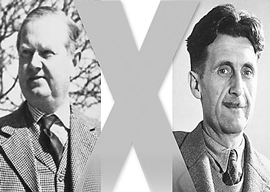
July 10, 2014

George Orwell and Evelyn Waugh
That’s all very well, but what is the alternative to meritocracy? The devout and reactionary Waugh looked to the landed aristocracy to manage the nation’s affairs. He can”t have thought they would do a very good job of it, to judge by the way he lampooned them in his novels; but anchored in tradition as they were, and with moral guidance from the Church, they would be humbler and wiser than the egocentric preeners from the examination halls.
Orwell didn”t think we needed a ruling elite. Machine production, he thought, made possible an age of universal prosperity. When everyone has all he needs, why bother with an elite? Emmanuel Goldstein’s counterrevolutionary book explains that: “An all-round increase in wealth threatened the destruction … of a hierarchical society.” The Party, however, has found a way to scotch this: “The problem of over-production is solved … by the device of continuous warfare.”
As alternatives, these don”t seem to me very promising. Orwell’s dream of a society of free and equal human beings is fantasy. No matter how much stuff we have, some of us must boss others around. Waugh’s gentry traditionalism is more real”has actually worked in the past; but we are now too far from it ever to return.
So we are stuck with the meritocracy. Personally I”d prefer the stiff, dutiful, un-intellectual public servants of the old American WASP or Imperial British dispensations”a George Marshall or a Lord Salisbury. I hate this new class of busybody world-improvers with their arrogance and expertise and extravagant idealism. They are all we”ve got, though, until artificial intelligence takes over.